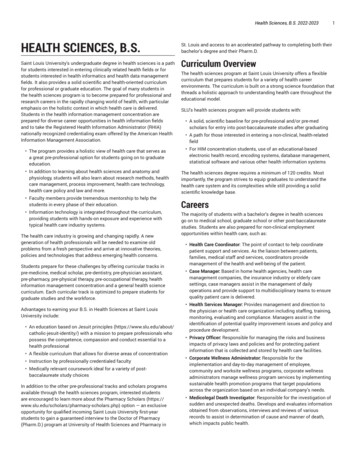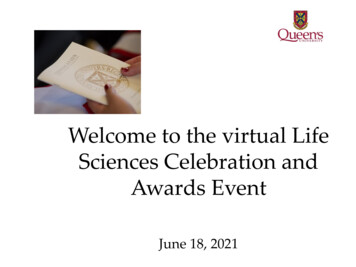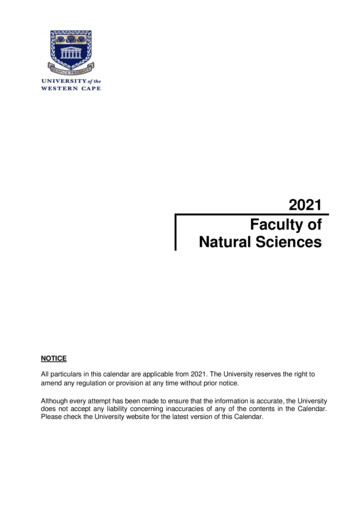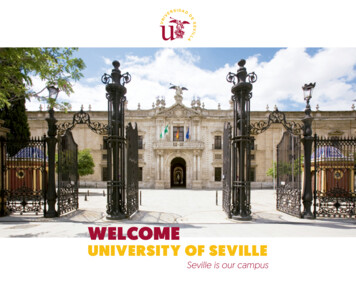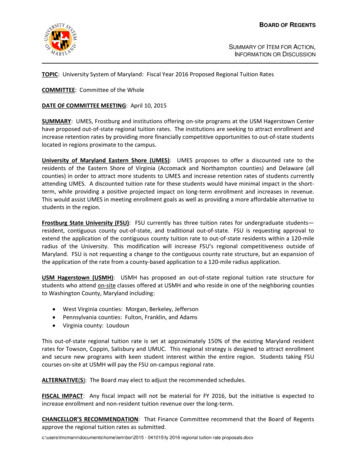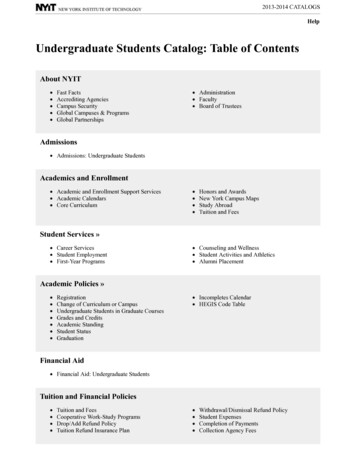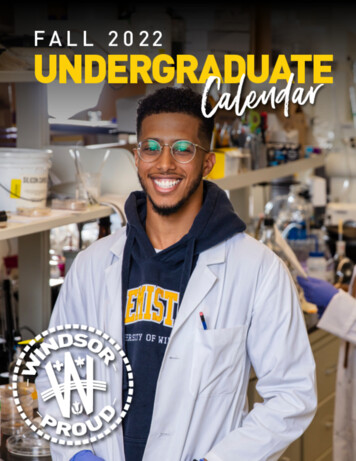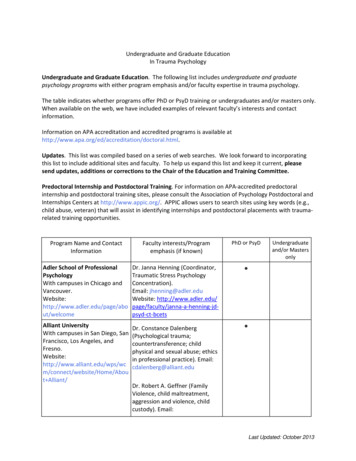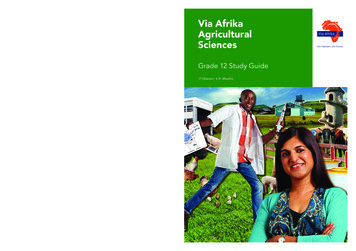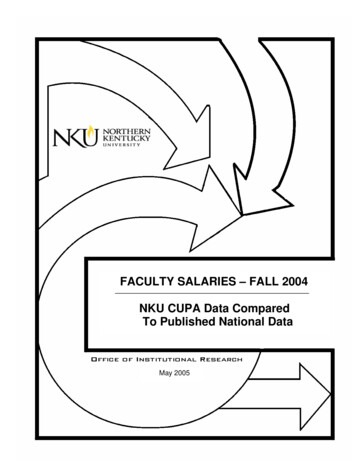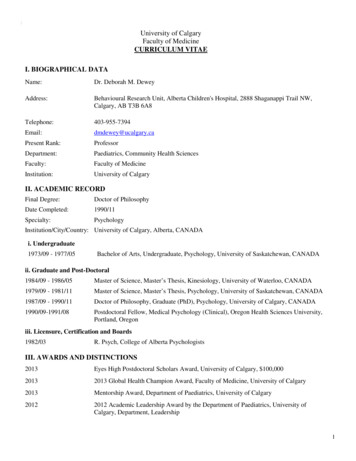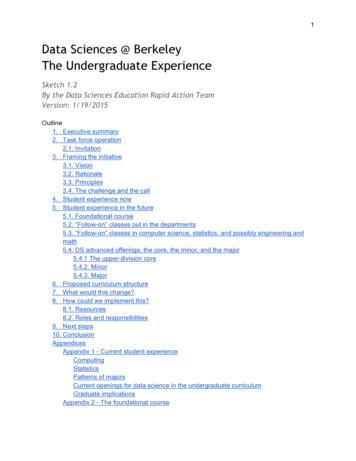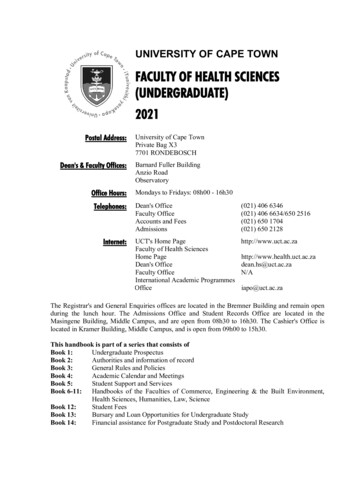
Transcription
UNIVERSITY OF CAPE TOWNFACULTY OF HEALTH SCIENCES(UNDERGRADUATE)2021Postal Address:Dean's & Faculty Offices:Office Hours:Telephones:Internet:University of Cape TownPrivate Bag X37701 RONDEBOSCHBarnard Fuller BuildingAnzio RoadObservatoryMondays to Fridays: 08h00 - 16h30Dean's OfficeFaculty OfficeAccounts and FeesAdmissions(021) 406 6346(021) 406 6634/650 2516(021) 650 1704(021) 650 2128UCT's Home PageFaculty of Health SciencesHome PageDean's OfficeFaculty OfficeInternational Academic lth.uct.ac.zadean.hs@uct.ac.zaN/Aiapo@uct.ac.zaThe Registrar's and General Enquiries offices are located in the Bremner Building and remain openduring the lunch hour. The Admissions Office and Student Records Office are located in theMasingene Building, Middle Campus, and are open from 08h30 to 16h30. The Cashier's Office islocated in Kramer Building, Middle Campus, and is open from 09h00 to 15h30.This handbook is part of a series that consists ofBook 1:Undergraduate ProspectusBook 2:Authorities and information of recordBook 3:General Rules and PoliciesBook 4:Academic Calendar and MeetingsBook 5:Student Support and ServicesBook 6-11: Handbooks of the Faculties of Commerce, Engineering & the Built Environment,Health Sciences, Humanities, Law, ScienceBook 12:Student FeesBook 13:Bursary and Loan Opportunities for Undergraduate StudyBook 14:Financial assistance for Postgraduate Study and Postdoctoral Research
The University has made every effort to ensure the accuracy of the information in its handbooks.However, we reserve the right at any time, if circumstances dictate (for example, if there are notsufficient students registered), to(i) make alterations or changes to any of the published details of the opportunities on offer; or(ii) add to or withdraw any of the opportunities on offer.Our students are given every assurance that changes to opportunities will only be made undercompelling circumstances and students will be fully informed as soon as possible.
CONTENTSGUIDE TO THE USAGE OF THIS HANDBOOK . 4GENERAL INFORMATION. 5Dean’s office, Faculty office and other central offices in the Faculty . 5Contact details of University and Faculty administrative offices dealing with student matters . 8Associated Teaching Hospitals . 9Contact details for the Health Sciences Student Council . 9Term dates . 9Definitions of terms used in this handbook . 10Programme, plan and course codes. 11GENERAL RULES FOR UNDERGRADUATE STUDENTS . 12RULES AND CURRICULA FOR UNDERGRADUATE PROGRAMMES . 20Bachelor of Medicine and Bachelor of Surgery . 22Bachelor of Science in Medicine . 30Bachelor of Science in Audiology and Bachelor of Science in Speech-Language Pathology. 34Bachelor of Science in Occupational Therapy. 39Bachelor of Science in Physiotherapy . 43Higher Certificate in Disability Practice . 48Advanced Diploma in Cosmetic Formulation Science . 49DEPARTMENTS IN THE FACULTY . 50List of Departments, Divisions and Units . 50Anaesthesia and Perioperative Medicine . 52Health and Rehabilitation Sciences . 56Health Sciences Education. 91Human Biology . 103Integrative Biomedical Sciences . 115Medicine . 119Obstetrics and Gynaecology . 146Paediatrics and Child Health. 156Pathology . 176Psychiatry and Mental Health . 187Public Health and Family Medicine . 194Radiation Medicine . 209Surgery. 212OTHER COURSES OFFERED . 229RESEARCH STRUCTURES . 238ADDITIONAL INFORMATION . 265Formulae for undergraduate degrees with honours and distinction . 265Class medals, Dean's Merit List and prizes . 273Guide to professional behaviour for undergraduate Health Sciences students . 280Process to investigate reported student impairment or unprofessional conduct . 284Guide to avoiding plagiarism . 287Policy on tuberculosis for undergraduate Health Sciences students . 293UCT Health Sciences Faculty e-learning and e-teaching policy . 296Student Transport Policy . 299Faculty Mission Statement. 304Faculty of Health Sciences Charter . 304Faculty of Health Sciences Declaration . 305Distinguished Teachers in the Faculty . 306GENERAL INDEX . 307
4 GENERAL RULES FOR UNDERGRADUATE STUDENTSGuide to the usage of this HandbookThe following is a general overview of the structure of this Handbook for the guidance of users. Thecontents are organised in a number of different sections (see below) each of which has a particularfocus. The sections are interlinked by cross-references where relevant.General Information: This section includes contact details, term dates, disciplines withindepartments, definitions of terminology used and other explanatory notes.General rules for undergraduate students: The rules in this section must be read in conjunction withthe degree-specific rules in the next section.Rules and curricula for undergraduate programmes: This section gives an outline of each of theundergraduate degrees and courses within those degrees, as well as rules relating to curricula. Pleasenote especially the readmission rules under each programme; students who fall foul of these rulesare in danger of being refused readmission.Other courses offered: This section lists courses that do not form part of the postgraduate degrees,and include stand-alone courses offered to students in this faculty or other faculties.Faculty structure and departments: The second half of this book lists all the teaching and researchstaff in departments and research structures.Additional information: This section gives details of prizes and awards, charters (e.g., the Teachingand Learning Charter) and Faculty-specific policies for postgraduate students.All students must also familiarise themselves with the University rules in Handbook 3, GeneralRules and Policies. Students are also expected to check annually whether the rules or curriculumrequirements have changed since the last edition of this Handbook or of the General Rules book.
GENERAL RULES FOR UNDERGRADUATE STUDENTS 5GENERAL INFORMATIONDean’s office, Faculty Office, and other central offices in theFacultyDEAN’S OFFICE AND FACULTY OFFICEL2, Barnard Fuller BuildingTel: 021 406 6346Dean:Associate Professor Lionel Green-Thompson, MBBCh DASA PhD FCASAProfessor and Deputy Dean: Research:A Wonkam, MBChB Cameroon MDDip (MedGenet) Switzerland PhD Cape TownProfessor and Deputy Dean: Postgraduate Education:E Ramugondo, BSc (Occupational Therapy) MSc (Occupational Therapy) PhD Cape TownDeputy Dean: Undergraduate Education:K Begg, MBChB Cape Town DCH CMSA DipObs CMSA FCPHM CMSADeputy Dean: Clinical Health Services:T Naledi, MBChB FCPHM SAFaculty Manager: Academic Administration:K Munesar, BA Social Work UDW PGDip (Personnel Management) DurbanManager: Postgraduate Administration:DJA Winckler, BA PretManager: Undergraduate Administration:C Cloete, LLB UWCPRIMARY HEALTH CARE DIRECTORATEOld Main Building, Groote Schuur Hospital, E47-25 (Tel: 021 406 6761)Chair and Director:S Reid, BSc (Medicine) MBChB Cape Town MFamMed Medunsa PhD UKZNSenior Lecturers:I Datay, MBChB Cape Town DPhil Oxon FCP South AfricaJ Irlam, BSc (Medicine)(Hons) MPhil (Epidemiology) Cape Town MSc (Climate Change &Development) Cape TownC Tsampiras, MA London PhD RhodesLecturer:S Crawford-Browne, MSocSc Cape TownHonorary Associate Professor:LJenkins,MBChB Stell MFamMed UKZN PhD Stell DipGynaecology)(Health Services Management) CMCA(Anaesthesia)(Obstetrics&
6 GENERAL RULES FOR UNDERGRADUATE STUDENTSHonorary Lecturers:K du Pré le Roux, MBChB Cape Town MA SwedenB Gaunt, MBChB Cape Town MSc London Dip (Anaesthesia)(Obstetrics & Gynaecology) SouthAfricaHonorary Research Associate:J Corrigall, MBChB Johannesburg DMH South Africa MMed Cape Town FCPHM South AfricaClinical Teaching Platform Manager:D Swart, BSc Hons (Medicine) HDE (Postgraduate) Cape Town MPhil UWCCBE Coordinator Eden District:H Reuter, HDE Rhodes MBChB Dip (Addictions Care) StellStudent Coordinator Eden District:F Marais, MBChB StellFacility Manager:S Naidoo, Dip (RNurs)(RM RK)(CHNurs) DurbanSite Facilitators:C Beauzac, BA Hons MA PhD UWCF JordaanP Ncamile, BA (HumSci) UnisaT Xapa, Dip (Adult Education)(Business Planning) Cape TownB Najaar, MNutrit Stell BSc (Diet) UWCSite Coordinators:N DanielsZ Geyer, BA Cape Town BSc (Medical Bioscience) UWCF Le RouxA Solomons, Dip (Human Resource Management) UnisaAdministrative Officer & PA to Director:C Johnston, BA WitsSenior Secretary:E Kennell, PDSD Cape TownCENTRE FOR BIOETHICSc/o Philosophy Department, 3.03 Neville Alexander Building, University Avenue, Upper Campus,University of Cape Town.The Bioethics Centre, formally established in 1992, grew out of the Bioethics Unit, which hasfunctioned informally in the (then) Faculty of Medicine since 1988. Since 2009, the Bioethics Centrehas been a joint Centre of the Faculty of Health Sciences and the Department of Philosophy in theFaculty of Humanities. Bioethics Centre staff are actively engaged in bioethics teaching andresearch, and provide a consultation service.To arrange bioethics consultations please email: bioethicsconsult@uct.ac.za (all emails to thisaddress are confidential). For general enquiries to the Bioethics Centre pleaseemail: bioethics@uct.ac.zaProfessor and Director:D Benatar, BSocScHons PhD Cape Town
GENERAL RULES FOR UNDERGRADUATE STUDENTS 7Emeritus Professor:SR Benatar, MBChB DSc (Medicine) Cape Town FFA FRCP (Hon) FCP (Hon) SAAssociate Professor:J Anthony, MBChB Cape Town FCOG SA MPhil StellJ de Vries, MSc Wageningen MSc European University Institute PhD OxonEmerita Associate Professor:A Pope, LDipLib Stell BA LLB Rhodes PGDip (International Research Ethics) Cape TownSenior ine)(Bioethics) University of TorontoG Fried, BAHons Cape Town MPhil PhD CantabE Galgut, BAHons MA Witwatersrand MA Cape Town PhD RutgersG Hull, BAHons Cantab MPhil PhD LondonHonorary Senior Lecturer:L Henley, MSocSc MPhil (Bioethics) PhD Cape TownPhD CapeTown MHSc
8 GENERAL RULES FOR UNDERGRADUATE STUDENTSContact details of University and Faculty administrative offices dealing withstudent matters[Note: The Academic Administration section of the Faculty Office of Health Sciences is situated inthe Wernher & Beit North building, one level down from the Dean’s Office.]Query:Whom to approach:Telephone:Academic transcripts/degreecertificatesRecords Office(021) 650 3595Admission: PostgraduatePostgraduate Admission section ofFaculty Office of Health Sciences(201) 406 6340/ 6028Admission: UndergraduateUndergraduate Admission sectionof Faculty Office of Health Sciences(021) 406 6634/ (021) 6503020Computer laboratory queriesICTS, Anatomy Building, HealthSciences campus(021) 406 6729Deferred examinationsRecords Office(021) 650 3595Fee problems/accountsCentral Fees Office (Kramer LawBuilding)(021) 650 2142Fee paymentsCashier’s Office (Kramer LawBuilding) (09h30 to 15h30)(021) 6502207/ 2146Financial assistanceStudent Financial Aid Office(Kramer Law Building)(021) 650 2125Medical Library queriesMedical Librarian, Health SciencesFaculty Library(021) 406 6130Registration issues: PostgraduatePostgraduate Administration sectionof Faculty Office of Health Sciences(021) 650 3004Registration issues: UndergraduateUndergraduate Administrationsection of Faculty Office of HealthSciences(021) 406 6634/ (021) 6503020Student health mattersStudent support: Postgraduate(other than academic support)Provision of non-academic support toFHS Undergraduate and PostgraduatestudentsStudent WellnessPostgraduate Administration sectionof Faculty Office of Health SciencesFaculty of Health Sciences StudentDevelopment & Support Office(FHS SDS Office)(021) 650 1020Undergraduate Curriculum MattersUndergraduate Administrationsection of Faculty Office of HealthSciences(021) 406 6634/ (021) 6503020(021) 406 6327(021) 650 7189/ (021) 6505393
GENERAL RULES FOR UNDERGRADUATE STUDENTS 9Associated Teaching HospitalsHospital:Chief Executive Officer:2 MILITARY HOSPITALCol JJ MolomoALEXANDRA HOSPITALMs Lynette van der BergGEORGE HOSPITALMr Michael VonkGROOTE SCHUUR HOSPITALDr Bavna PatelKINGSBURY HOSPITALDr Shrey VirannaKNYSNA HOSPITALDr Earl du PlooyLIFE VINCENT PALLOTTIGavin Pike (Hospital Manager)MITCHELLS’ PLAIN DISTRICT HOSPITALDr Hans HumanMOSSEL BAY HOSPITALDr Paul RüschenbaumNEW SOMERSET HOSPITALDr Donna StokesOUDTSHOORN HOSPITALDr Charles Dreyer (Medical Manager)RED CROSS CHILDREN'S HOSPITALDr Matodzi MukosiTYGERBERG HOSPITALDr Dimitri ErasmusVALKENBERG HOSPITALMrs Carol DeanVICTORIA HOSPITALMr Patrick Jeftha (acting)VREDENBURG HOSPITALDr Silvio Morales-PerezHealth Sciences Student CouncilLocation: Ground Floor (Next to the Cafeteria), Barnard Fuller BuildingTelephone: 021 650 3750Email: hssc@myuct.ac.zaOffice Hours: 13h00-14h00 and 16h30-17h30Term dates 2021Please refer to the UCT website: https://www.uct.ac.za/main/calendar/terms
10 GENERAL RULES FOR UNDERGRADUATE STUDENTSDefinitions of terms used in this handbookConcession: Formal Senate approval exempting a student from complying with a required rule.Curriculum: Prescribed course of study for a degree or diploma.DP (Due Performance) requirement: Required minimum level of performance during the year toqualify a student to do an examination in a particular course.Exemption and credit: Exemption from a course means that a student need not complete thiscourse since they have passed an equivalent course before. They are then also given credit towardsthe programme for the course they passed before.Health and Rehabilitation Sciences: Physiotherapy, Occupational Therapy, Audiology, SpeechLanguage Pathology, Disability Studies and Nursing.HEQSF course level and NQF credits: The University is required to align its qualifications withthe Higher Education Qualifications Sub-framework or HEQSF (which forms part of the NationalQualifications Framework). In terms of the Framework, the following criteria apply: A Bachelor’s degree of four or more years is at HEQSF exit level 8 and must have a minimumof 480 credits. Minimum credits at HEQSF level 7: 120; minimum credits at HEQSF level 8:96. Courses with content pitched at first year level are at HEQSF level 5; those at second yearlevel at HEQSF level 6; those at third year level at HEQSF level 7; and those at fourth to sixyear at HEQSF level 8. NQF credits: 1 credit is 10 notional hours of learning.ISCE: Integrated Structured Clinical Examination.Joint staff: Staff employed jointly by the University and the Provincial Government of the WesternCape (PGWC).OSCE: Objective Structured Clinical Examination.OSPE: Objective Structured Practical Examination.Convener: Academic staff member in charge of offering the degree or a course within the degreeprogramme.Readmission requirements: Requirements a student must meet to be permitted to continue with theprogramme. A student who fails to meet one or more of these requirements may be refusedreadmission.Semester: A half-year.Academic year of study: A suite of courses that must be completed at a specific academic level(e.g.: fourth year MBChB)Calendar year: A year which starts in January and ends in December and may contain courses frommore than one academic year.
GENERAL RULES FOR UNDERGRADUATE STUDENTS 11Programme, plan and course codesEach study programme has a code, indicating:M Faculty of Health SciencesB Bachelor's degree a 3-digit numberExample: BSc Physiotherapy MB004.The undergraduate programme codes are as follows:MB001 BSc (Medicine)MB003 BSc Occupational TherapyMB016 BSc Occupational Therapy Intervention ProgrammeMB004 BSc PhysiotherapyMB017 BSc Physiotherapy Intervention ProgrammeMB010 BSc Speech-Language PathologyMB018 BSc Speech-Language Pathology Intervention ProgrammeMB011 BSc AudiologyMB019 BSc Audiology Intervention ProgrammeMB014 MBChBMB020 MBChB Intervention ProgrammeMU002 Higher Certificate in Disability PracticeMU003 Advanced Diploma in Cosmetic Formulation ScienceNote: This is to confirm that by virtue of inclusion on the Institution's DHET approved Programmeand Qualification Mix (PQM), all qualifications included in this Handbook are accredited by theCouncil on Higher Education's permanent sub-committee - the Higher Education QualityCommittee. Where a SAQA ID has not been provided, the qualification is awaiting the SAQA ID.The higher education sector has undergone an extensive alignment to the Higher EducationQualification sub-Framework and thus all institutions are awaiting the finalisation of the processand completion of the awarding of SAQA ID's. Affected qualifications are marked *Please consult Handbook 2 or the HEQFs Programme and Qualification Mix (PQM) on theInstitutional Planning Department's website, as approved by the Department of Higher Educationand Training, for a list of all UCT's accredited qualifications.Every course has a course title and a course code.The structure is:AAA1nnnS, where:AAAis a 3 alpha group identifying the department.1is a number identifying the year level at which the course is usually taken.nnnis a three-character number that identifies the course uniquely.Sis a single alpha character, specifying the time period during which the course isoffered.In many cases, the only change is the addition of a zero as the first identifying number.For example: AHS373F becomes AHS3073F.Courses use one of the following possible suffixes, which refer to the following time periods:FFirst SemesterSSecond SemesterWFull Year – First and Second Semesters[Note: The course extension does not denote the volume of work in the course or the relativeweighting of the course in that year of study. The volume of work is determined by the NQF creditvalue of the course.]
12 GENERAL RULES FOR UNDERGRADUATE STUDENTSGENERAL RULES FOR UNDERGRADUATE STUDENTS[Note: All students must also familiarise themselves with the general rules for all students at UCT,contained in Handbook 3 of this series.]Registration dates and first-year orientation, late registration and attendance ofnon-registered studentsFGU1.1All first-year students are required to attend all academic orientation activities.Failure to do so without permission may prevent entry to first semester courses.FGU1.2All students are required to renew their registration formally each year. Noretrospective registration is allowed.FGU1.3All students are required to adhere to the registration dates set out in this Handbookand/or notices sent to students by the University administration in the yearpreceding registration/re-registration. Students who register late are charged apenalty fine.FGU1.4Except by permission of the Senate, a person who has not registered for the currentyear shall not be allowed to attend academic commitments and shall have no accessto University facilities. Students who have not re-registered because they have feesoutstanding may apply formally to the Deputy Vice-Chancellor concerned, via theFaculty Office, for a specified “grace period” (a grace period is granted only if thereis documentary evidence that funds will become available) while they makearrangements to have their fees paid. In cases where students have been granted agrace period and allowed to attend despite not being registered, they may not begiven results of any assessments.Registration of students with professional bodiesFGU2.1All undergraduate students are required to register with the Health ProfessionsCouncil of South Africa upon admission to their respective degree programmes andare bound by that Council's regulations.Final year MBChB students are registered as student interns with the HealthProfessions Council of South Africa and, upon their qualification, as interns, arebound by that Council's regulations. Qualified students are required to do two years'internship and one year's community service.Upon qualifying in their final year of study, students in the BSc Audiology, BScSpeech-Language Pathology, BSc Occupational Therapy and BSc Physiotherapydegree programmes are required to register with the relevant professional board ofthe Health Professions Council of South Africa and do one year's communityservice before they may practise in their respective disciplines.FGU2.2From the second year of study, BSc Physiotherapy students are required tosubscribe to the South African Society of Physiotherapy in order to obtain studentprofessional malpractice insurance.Hepatitis B immunisationFGU3It is compulsory for all undergraduate students to have received a full course ofHepatitis B immunisation by the end of July of their first year of study. Studentswill not be permitted to register for the second year of study until they havesubmitted to the Faculty Office written proof that they have received a full courseof such vaccination.
GENERAL RULES FOR UNDERGRADUATE STUDENTS 13Rules for degrees and diplomas, and changes to courses and curriculaFGU4.1Every candidate for a degree or diploma must attend and complete such qualifyingcourses or perform such work as may be specified in the rules for that degree,diploma or certificate. The University reserves the right to revise its rules from timeto time, and any alteration of or addition to the rules for any degree or diplomashall, on the date specified in the notice of promulgation of such alteration oraddition, become binding upon all candidates for that degree or diploma.FGU4.2The University has made every effort to ensure the accuracy of the information inits handbooks. However, it reserves the right at any time, if circumstances dictate,to:(a)make alterations or changes to any of the published details of the coursesand curricula on offer; or(b)add to or withdraw any of the courses or curricula on offer.[Note: The Health Professional Council of South Africa requires faculties of health sciences tomonitor a health science student’s fitness to train or practise healthcare, and to report cases wherea student is, following professional assessment, deemed unfit for practice.]The following definitions apply:Impaired: The Health Professions Council (HPCSA) defines impairment as “a condition whichrenders a practitioner incapable of practising a profession with reasonable skill and safety”.Unprofessional conduct: The HPCSA defines unprofessional conduct as “improper or disgracefulor dishonourable or unworthy conduct or conduct which, when regard is taken to the profession of aperson who is registered in terms of this Act, is improper or disgraceful or dishonourable orunworthy”.In terms of the Medical Dental and Supplementary Health Service Professions Act, a student orpractitioner is required to:(a)(b)report impairment in another student or practitioner to the Council if they wereconvinced that such other student or practitioner were impaired as defined in the Act;self-report their impairment to the Council if they were aware of their own impairmentor have been publicly informed of being impaired or have been seriously advised by acolleague to act appropriately to obtain help in view of an alleged or establishedimpairment.The Faculty has a Student Development & Support Committee whose purpose in the first instance isto support students who experience health-related or other difficulties. The Committee strives toprovide on-going support to students with medical (including mental health) problems. All possibleattempts are made to assist students to get well before steps are taken to recommend a review of astudent’s suspected or reported impairment. (See Process to Investigate Reported studentImpairment or Unprofessional Conduct at the back of this handbook.)All matters relating to student health are treated in the strictest confidence, and the number ofacademic or support staff who by nature of their work have access to confidential studentinformation is limited to the absolute minimum.The rules below need to be read within this context.
14 GENERAL RULES FOR UNDERGRADUATE STUDENTSFGU5.1Students registered for degrees involving clinical work or work with clients areexpected to act in accordance with the ethical norms laid down by the HealthProfessions Council of South Africa. Students who are found guilty ofunprofessional conduct after a formal process to investigate reported unprofessionalbehaviour may be required to terminate their registration in the Faculty.Students who are found to be physically or otherwise impaired after a formalreview impairment process has been undertaken may also be required to terminatetheir registration in the Faculty.Where a student who qualifies for the award of the degree or certificate for whichthey are registered, or where a student, in the course of their studies, followingprofessional assessment, is deemed unfit to practise healthcare, the Dean will reportthe outcome of such professional assessment to the relevant regulatory body andinform the student accordingly.FGU5.2A student who has taken formal leave of absence for a medical reason is required toapply to the UCT Fit for Study Panel to return. The student must ensure that theirtreating healthcare professional/s submit/s, to the Fit for Study Panel by a givendate (usually four weeks) before the student’s intended date of return, a completedmedical report (on a template provided by the Faculty’s Student Support Office). Incases of students within the clinical years of study, the Faculty, in addition to the FitFor Study Panel’s initial decision, requires a secondary assessment by a healthprofessional of the Faculty’s choice with a view to establishing whether the studentis fit to work with patients or clients. The is facilitated by the Faculty’s StudentDevelopment and Support Committee (SDSC) before reporting back to the Fit forStudy Panel. The Fit for Study Panel will then inform the student of the finaldecision. The Faculty may set additional conditions for return, which may include,for example, return to clinical shadowing to upgrade clinical skills and/or on-goingmonitoring of continued fitness for training/practice.If the Fit for Study Panel decides that the student is not fit
6 GENERAL RULES FOR UNDERGRADUATE STUDENTS Honorary Lecturers: K du Pré le Roux, MBChB Cape Town MA Sweden B Gaunt, MBChB Cape Town MSc London Dip (Anaesthesia)(Obstetrics & Gynaecology) South Africa Honorary Research Associate: J Corrigall, MBChB Johannesburg DMH South Africa MMed Cape Town FCPHM South Africa Clinical Teaching Platform Manager:
